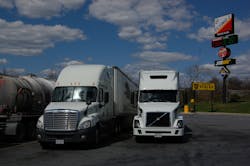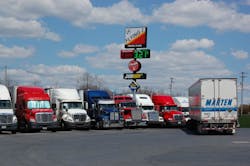In a way, Aaron McCann serves as the face of new tactic in the battle among truck stop chains for customer business: the personal touch.
Armed with nothing more than an orange vest and a thousand-watt smile, McCann’s primary job as a “diesel service champion” or DSC at the Flying J Travel Center off I-78 in Frystown, PA, entails directing commercial vehicles to open fueling slots or the shortest line for them at the facility’s 11 lane diesel refueling island.[To view more photos, click here.]
Yet it’s his secondary role as an “ambassador” that fulfills one of the carefully-designed procedures at the Frystown Flying J: offering a friendly face to drivers often isolated from human contact for hours at a stretch; a welcoming personality who can offer information about the local area, the truck stop amenities, or a willing ear for just some small talk.
“I just try to find a way to put a smile on their face,” McCann (seen above) told Fleet Owner, yet it is that simple philosophy that can pay big dividends long term in terms of generating return business, noted Gary Saunders, general manager of the Flying J’s Frystown location.
“A truck driver may only stop once or twice per day,” Saunders explained to Fleet Owner. “The rest of the time they are only talking to people by Bluetooth. So that face-to-face connection is critical.”
Even though Flying J’s Frystown site is a full-service spot – with Cat Scales, Boss repair shop, and IdleAir franchise co-located with the primary 12,771 sq. ft. truck stop facility on the 56.27 acre property – Saunders said it’s the “personal touch” offered by McCann and his two “coffee hostesses,” not to mention the rest of his 55-member staff, that often make the difference as to whether a driver will return to the Frystown travel plaza.
“On the one hand, we offer everything to make a stop convenient for the truck driver and the fleet,” he said. “But they [the drivers] really like that personal touch. Our coffee hostesses know drivers by their first name and ask about their families. They are fantastic at what they do.”This focus on the “personal touch” is becoming something of a “competitive differentiator” among the 2,500 or so truck stops across the U.S.
Darren Schulte, VP of membership for NATSO – formerly known as the National Association of Truck Stop Operators – told Fleet Owner that his organization recently did a quick “snap survey” of 100 or so truck drivers over a 2.5 day period at a NATSO-member location. The member in question thought the main selling point of his truck stop location revolved around maintaining low fuel prices.
Not so, noted Schulte. “The number one reason the drivers we surveyed said they selected this gentleman’s location? The friendliness of the staff,” he said. “Low fuel prices actually ranked third, with the quality of food in second place.”
Schulte also noted that NATSO’s research indicates that the “fundamentals” make a huge difference in the truck stop industry today, with the “personal touch” packaged together with clean showers, clean facilities overall, and more focus on specific customer attributes.
“It’s really critical to understand the specific customers using your particular location,” he said. “Are they owner-operators or company drivers? Do you get a lot of pet owners?”That’s why many truck stops offer dog walking paths and walking paths for drivers, Schulte pointed out. Even driver ethnicity can play a role in tailoring truck stop accommodations, such as having bilingual staff or offering specific kinds of food, he explained.
Schulte also noted that the truck stop industry is also returning to its roots in a way by splitting into two distinct camps: the full-service facility and the fuel-and-go location.
“Historically, everyone tried to provide everything – washers and dryers, truck washes, repair shops, etc.,” he pointed out. “Today, though, with the hours-of-service (HOS) rule changes made several years ago, time is money. So now drivers and fleets stop based on whether they need just fuel and food or if a longer stop for maintenance or overnight parking is needed.”
Yet even the short-term “fuel-and-go” locations are deploying the personal touch as well, Schulte added.
“One of our members developed a ‘food while you fuel’ option so they could place an order while refueling their truck. Then it gets brought out to them by a ‘truck hop’ server,” he explained. “It’s a way to make that stop, however short in duration, a more friendly experience. And making it more personal may convince that driver and/or fleet to use that truck stop again down the road.”
About the Author
Sean Kilcarr
Editor in Chief
Sean Kilcarr is a former longtime FleetOwner senior editor who wrote for the publication from 2000 to 2018. He served as editor-in-chief from 2017 to 2018.



